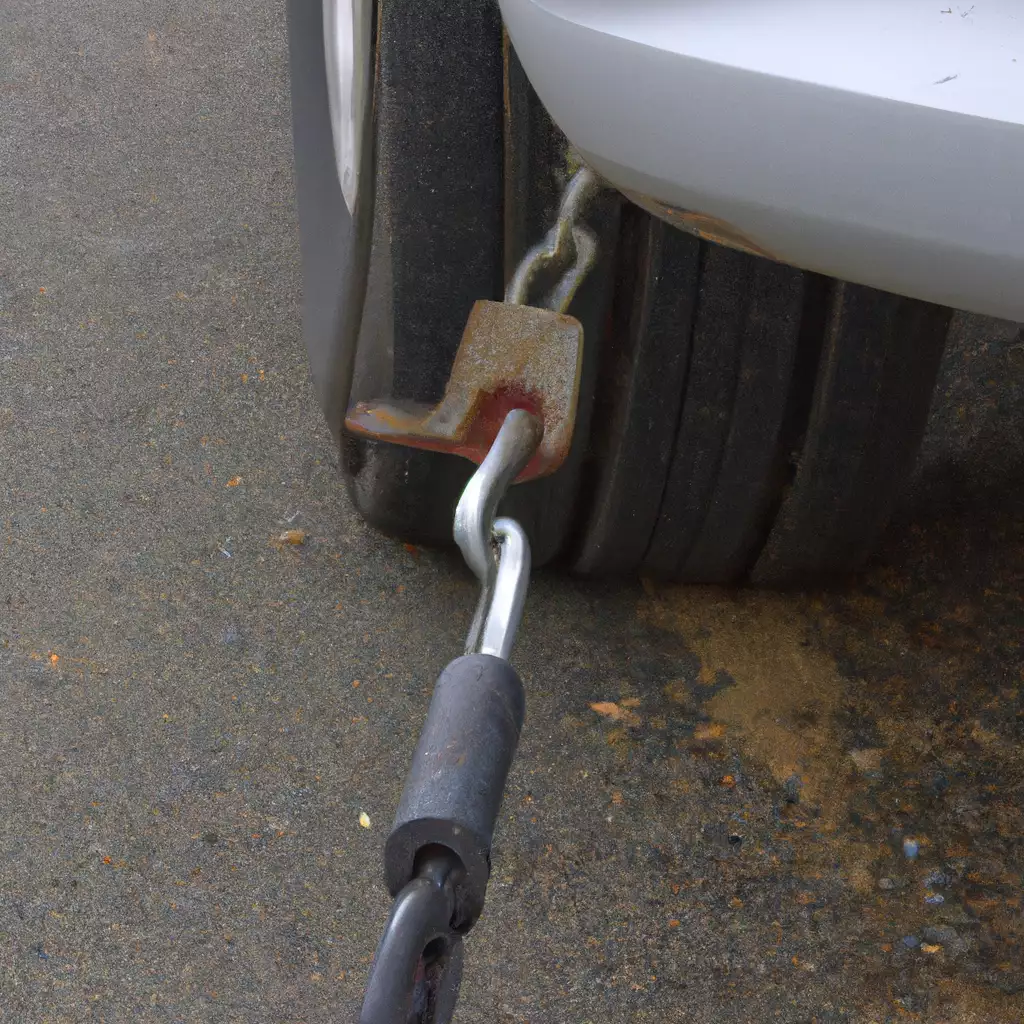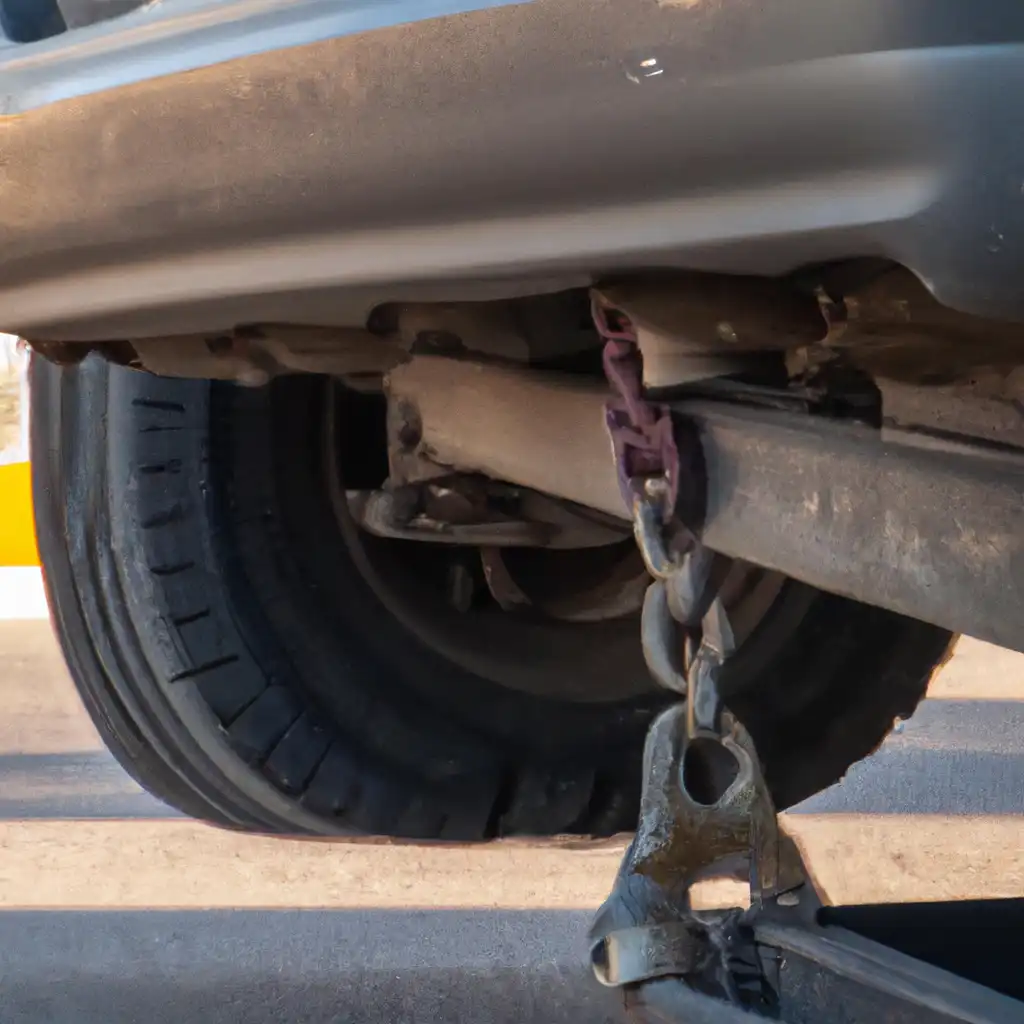When it comes to towing, it is crucial to understand the limits and capacities of your vehicle. However, there may be instances where you find yourself in a situation where you exceed the designated tow capacity. This article uncovers the potential consequences of exceeding your vehicle’s tow capacity, shedding light on the impact it can have on your safety, the performance of your vehicle, and the overall well-being of both your vehicle and the items being towed.
Vehicle Damage
Excessive Wear and Tear: When you exceed the towing capacity of your vehicle, it puts excessive strain on various components, leading to accelerated wear and tear. The added weight and force can cause parts like the suspension, brakes, and transmission to deteriorate more quickly than normal. This can result in costly repairs and replacements down the line.
Mechanical Failures: Overloading your vehicle beyond its tow capacity can lead to mechanical failures. The added stress on the engine, transmission, and other vital components can cause them to break down or malfunction. This can leave you stranded on the side of the road and necessitate expensive repairs or even complete replacements.
Engine Overheating: Exceeding the tow capacity can also cause engine overheating. Your vehicle’s engine is designed to operate within a specific temperature range, and hauling loads beyond its limits can cause it to overheat. This can lead to irreversible damage to the engine and may require extensive repairs or engine replacement.
Transmission Damage: Towing loads that exceed your vehicle’s towing capacity can put excessive strain on the transmission system. The transmission is responsible for transferring power from the engine to the wheels, and towing beyond its limits can cause it to overheat and wear out prematurely. Transmission repairs or replacements are often costly, and neglecting to address transmission damage can lead to total transmission failure.
Safety Risks
Poor Braking Abilities: Overloading your vehicle beyond its towing capacity can significantly impair its braking abilities. The added weight puts additional strain on the braking system, resulting in longer stopping distances and reduced effectiveness. This can increase the risk of accidents, especially in emergency situations where quick and efficient braking is necessary.
Loss of Steering Control: When you exceed the tow capacity, it becomes more challenging to maintain control over your vehicle’s steering. The added weight can cause the vehicle to become less responsive, increasing the risk of swerving or losing control while navigating corners or making sudden maneuvers. This loss of steering control can be hazardous, putting you and other road users at risk.
Increased Risk of Accidents: Exceeding the tow capacity not only compromises your vehicle’s handling but also increases the overall risk of accidents. The added weight can make your vehicle less stable and more prone to tipping or rolling over. Additionally, the increased strain on the vehicle’s suspension and tires can lead to sudden failures, such as tire blowouts, increasing the likelihood of accidents.
Tire Blowouts: Overloading your vehicle beyond its towing capacity can cause tire blowouts. The added weight places excessive stress on the tires, increasing the chances of them bursting while in motion. A tire blowout can result in a loss of control, leading to accidents or collisions. It’s crucial to ensure that your vehicle stays within its tow capacity to reduce the risk of tire blowouts and maintain safe driving conditions.

This image is property of pixabay.com.
Legal Consequences
Traffic Violations: Exceeding the tow capacity can lead to traffic violations. Most jurisdictions have laws and regulations in place regarding safe towing practices, including restrictions on weight limits. If you tow a load that exceeds the authorized capacity, you could face traffic violations, such as fines, points on your license, or even license suspension, depending on the severity of the violation.
Fines and Penalties: In addition to traffic violations, exceeding the tow capacity can result in fines and penalties imposed by law enforcement agencies. These fines can vary depending on the extent of the violation and local regulations. By staying within the designated tow capacity, you can avoid these financial repercussions and ensure compliance with the law.
Vehicle Impoundment: In extreme cases where the vehicle’s weight exceeds the limit by a significant margin, law enforcement authorities may impound your vehicle. Vehicle impoundment can be both financially burdensome and inconvenient, as you may incur towing and storage fees while also facing additional penalties. Avoiding overloading your vehicle can help prevent such situations and ensure the uninterrupted use of your vehicle.
Increased Insurance Costs: Exceeding your vehicle’s tow capacity can have long-term financial implications, including increased insurance costs. Insurance companies often take into account factors such as vehicle modifications, towing capacity violations, and increased accident risks when determining premium rates. By adhering to the designated tow capacity, you can help maintain affordable insurance rates and avoid unnecessary financial strain.
Reduced Fuel Efficiency
Increased Fuel Consumption: Overloading your vehicle beyond its towing capacity can have a detrimental effect on fuel efficiency. The added weight requires your engine to work harder, causing an increase in fuel consumption. Hauling loads that exceed your vehicle’s limits can result in more frequent trips to the gas station and significantly higher fuel expenses.
Deteriorated Mileage: Towing loads beyond the tow capacity can also lead to deteriorated mileage. Your vehicle’s engine efficiency and overall performance can suffer, resulting in a decrease in the number of miles you can travel on a full tank of gas. This reduced mileage increases not only your fuel costs but also the frequency of refueling, reducing overall convenience.
Negative Impact on the Environment: Overworking your vehicle by exceeding its tow capacity has a negative impact on the environment. Increased fuel consumption means more greenhouse gas emissions, contributing to air pollution and climate change. By adhering to your vehicle’s tow capacity, you can help minimize your carbon footprint and contribute to a cleaner environment.
Higher Fuel Costs: Towing loads beyond your vehicle’s tow capacity doesn’t just result in increased fuel consumption but also higher fuel costs. The added weight places additional strain on the engine, requiring it to burn more fuel to maintain performance. The expenses associated with excessive fuel consumption can add up over time, putting a strain on your budget and overall financial well-being.

This image is property of pixabay.com.
Excessive Strain on Suspension
Damaged Springs and Shocks: Exceeding the tow capacity can lead to damaged springs and shocks. The added weight puts excessive strain on these components, causing them to wear out prematurely. Damaged springs and shocks can result in a rough and uncomfortable ride, reduced stability, and compromised handling. It is essential to stay within your vehicle’s tow limits to avoid unnecessary strain on the suspension system.
Weakened Frame Integrity: Overloading your vehicle can weaken its frame integrity. The excessive weight of the towed load causes the frame to flex and bend beyond its intended limits. This can lead to structural damage, compromising the overall safety and reliability of the vehicle. Maintaining a proper balance between your towing needs and your vehicle’s capabilities can help ensure the integrity of your vehicle’s frame.
Uneven Weight Distribution: Towing loads that exceed your vehicle’s towing capacity can cause uneven weight distribution. Unequal distribution of weight places uneven strain on various components, including the suspension system. This can lead to imbalanced handling, reduced stability, and an increased risk of accidents. Properly distributing the weight within the tow limits can help maintain optimal vehicle performance and safety.
Reduced Ride Comfort: Overloading your vehicle beyond its towing capacity can significantly impact your ride comfort. The additional weight strains the suspension system, compromising its ability to absorb road imperfections and shocks. This results in a rough and uncomfortable ride, affecting not only your driving experience but also your overall well-being. Adhering to your vehicle’s tow capacity helps preserve ride comfort and ensures a smoother journey.
Overworking the Engine
Overheating: Overloading your vehicle beyond its towing capacity can lead to engine overheating. The engine is responsible for generating power, and towing loads beyond its limits causes it to work harder and generate more heat than it can dissipate effectively. Engine overheating can cause severe damage, ranging from blown gaskets to a complete engine failure. This can result in costly repairs and significant inconvenience.
Reduced Power and Performance: Exceeding the tow capacity can result in reduced power and performance from your engine. The added weight places excessive strain on the engine, making it less responsive and capable of delivering the expected performance. This can result in sluggish acceleration, reduced power to climb inclines, and overall decreased performance. By sticking to your vehicle’s tow limits, you can ensure optimal engine performance.
Potential Engine Failure: Overworking your engine by towing loads beyond its capacity increases the risk of engine failure. The additional strain on the engine can cause essential components to fail, resulting in a complete breakdown. Replacing or rebuilding an engine is a significant expense, and the resulting downtime can be highly inconvenient. Avoiding excessive load towing minimizes the risk of engine failure and helps maintain the longevity of your vehicle’s engine.
Increased Maintenance Costs: Towing loads beyond the authorized capacity can escalate your vehicle’s maintenance costs. The additional strain on the engine, transmission, and other crucial components often leads to premature wear and damage. This translates to more frequent repairs, replacements, and servicing. By adhering to your vehicle’s towing capacity, you can reduce unnecessary maintenance expenses and ensure hassle-free ownership.

This image is property of pixabay.com.
Difficulty Controlling the Vehicle
Loss of Stability: Exceeding the tow capacity significantly impacts the stability of your vehicle. The added weight makes it more challenging to keep the vehicle stable, especially at higher speeds or in adverse weather conditions. Loss of stability can lead to fishtailing, swaying, or even jackknifing of the trailer, which can result in accidents or collisions. Staying within your vehicle’s authorized tow limit helps maintain stability and overall control.
Swerving and Swaying: Overloading your vehicle beyond its towing capacity can cause swerving and swaying while in motion. The additional weight can make it difficult to keep the vehicle on a straight course, resulting in erratic movements. This increases the risk of losing control and colliding with other vehicles or objects on the road. By towing within your vehicle’s limits, you can ensure a safer and more predictable driving experience.
Increased Stopping Distance: Towing loads beyond the authorized capacity makes it harder to bring your vehicle to a stop promptly. The added weight and strain on the braking system lengthen the stopping distance, reducing your ability to react to sudden obstacles or hazards on the road. This increased stopping distance can significantly increase the risk of rear-end collisions or other accidents. Staying within your vehicle’s tow capacity helps maintain optimal braking performance.
Impaired Maneuverability: Overloading your vehicle can impair its maneuverability, making it harder to navigate corners, change lanes, or make complex maneuvers. The added weight affects the vehicle’s responsiveness and agility, reducing your ability to maneuver in congested traffic or navigate tight parking spaces. Adhering to your vehicle’s tow limits ensures that you can maintain optimal maneuverability and safely navigate various driving scenarios.
Impact on Towing Equipment
Strain on Hitch Components: Towing loads that exceed your vehicle’s tow capacity put a significant strain on the hitch components. The additional weight can cause excessive stress on the hitch receiver, ball mount, and other relevant parts. This strain can lead to deformation, cracking, or even complete failure of these components, compromising their effectiveness and increasing the risk of detachment or accidents.
Weakened Wires and Cables: Overloading your vehicle beyond its towing capacity can weaken the wires and cables connecting the towing vehicle to the trailer. The excessive weight can cause these wires and cables to stretch, fray, or even snap, impairing the electrical connection between the two vehicles. This can result in faulty trailer lights, brake lights, or turn signals, creating hazardous driving conditions for both you and other motorists.
Damage to Brake Systems: Towing loads that exceed your vehicle’s tow capacity can cause damage to the brake systems of both the towing vehicle and the trailer. The added weight puts strain on the brake pads, rotors, and calipers, causing them to wear out faster than usual. Moreover, overloading the trailer can overload its brake system, leading to reduced braking effectiveness and potential failures. Checking and maintaining the integrity of your towing equipment is crucial to avoid such issues.
Premature Wear on Tires: Overloading your vehicle can result in premature wear on the tires. The added weight increases the stress placed on the tires, causing them to wear down more quickly than intended. This accelerated wear can lead to tire failures, such as blowouts, and compromise your vehicle’s handling and stability. Regularly inspecting and ensuring proper tire conditions are essential to mitigate these risks associated with overloading.

Decreased Resale Value
Unreliable Towing History: Exceeding the tow capacity can negatively impact the resale value of your vehicle. Prospective buyers may be hesitant to purchase a vehicle with a history of being regularly overloaded or put under excessive strain. An unreliable towing history raises concerns about the vehicle’s overall durability, potentially leading to lower resale values and a limited pool of interested buyers.
Excessive Wear on Components: Overloading your vehicle beyond its towing capacity accelerates wear and tear on various components. Excessive strain on the suspension, braking system, transmission, and engine can cause these parts to deteriorate more quickly than expected. This deterioration raises concerns among potential buyers regarding the vehicle’s integrity, potentially leading to a decrease in resale value.
Limited Market Appeal: Overloaded vehicles often have limited market appeal. Potential buyers typically look for vehicles that can cater to their towing needs without compromising safety, performance, or reliability. A vehicle with a history of overloading may not align with these expectations, reducing its market appeal and potentially resulting in a prolonged selling period or lower offers from buyers.
Lower Trade-In or Selling Prices: Exceeding the towing capacity can lead to lower trade-in or selling prices for your vehicle. Dealerships and buyers consider multiple factors when evaluating a vehicle’s worth, including its mechanical condition, maintenance history, and towing habits. If you have consistently overloaded your vehicle, dealerships may offer lower trade-in values, while private buyers may negotiate reduced selling prices due to concerns about the vehicle’s overall condition.
Voided Warranty
Violation of Towing Guidelines: Exceeding your vehicle’s tow capacity directly violates the manufacturer’s towing guidelines. Most warranties include specific instructions on towing limits to ensure the vehicle’s longevity and performance. By disregarding these guidelines, you risk voiding your vehicle’s warranty, leaving you financially responsible for repairs or replacements that would otherwise be covered by the warranty.
Unauthorized Modifications: Overloading your vehicle beyond its authorized tow capacity often requires modifications to the towing system. Making unauthorized modifications or alterations to your vehicle for towing purposes can also void your warranty. Manufacturers design vehicles with specific capabilities in mind, and exceeding these limits or modifying them without proper authorization can compromise the vehicle’s integrity and functionality.
Manufacturer Refusal of Repairs: In the event of damage resulting from overloading, manufacturers may refuse to cover repairs under warranty. Exceeding your vehicle’s tow capacity places undue stress on various components, leading to accelerated wear and potential failures. When seeking warranty repairs, manufacturers may inspect the vehicle and determine that the damage is a result of overloading. This refusal can leave you financially responsible for costly repairs that would have otherwise been covered.
Loss of Protection: Overloading your vehicle beyond its towing capacity can result in a loss of warranty protection. Manufacturers provide warranties to protect consumers from unforeseen mechanical failures or defects. However, violating towing limits can be seen as misuse of the vehicle and may nullify your warranty coverage. Losing warranty protection can leave you susceptible to bearing the full cost of repairs or replacements, placing a significant financial burden on you as the owner.
In conclusion, exceeding the tow capacity of your vehicle can have severe consequences. From vehicle damage and safety risks to legal consequences and reduced fuel efficiency, the risks associated with overloading are numerous. Not only can overloading compromise the performance, longevity, and safety of your vehicle, but it can also result in financial burdens such as fines, penalties, increased insurance costs, and decreased resale value. It is essential to understand and adhere to your vehicle’s tow capacity to preserve its integrity and ensure a safe and efficient towing experience.
